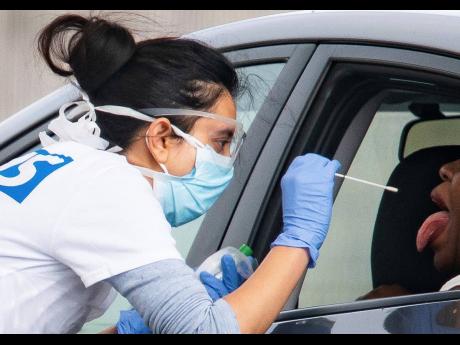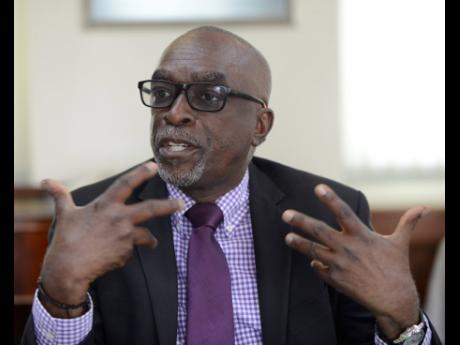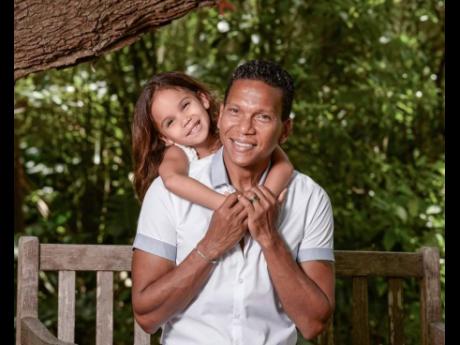I cry almost every night, says COVID-positive woman - Dehring, Parchment Brown also give peek inside their journeys
It’s one of the most frightful concerns for many Jamaicans at the moment.
With infection numbers soaring over the past month, the COVID-19 pandemic has entered a new dimension locally, health officials announcing that the country has entered the community spread phase. This designation means health specialists can no longer track the spread of the coronavirus from person to person as the country begins to hit its peak caseload.
According to data published by the Ministry of Health and Wellness yesterday, Jamaica recorded 112 additional cases of the coronavirus on Friday, bringing the total number of those confirmed infected to 3,623. The illness has also claimed 40 lives locally.
Behind the numbers are real people struggling to deal with their diagnoses and grieving from their loss.
There are also many in quarantine after coming into contact with confirmed patients or having been in situations where they could have been exposed to the virus over the last two weeks. At the last count on Friday, the health ministry said, the persons in quarantine numbered 25,925.
For many, the road to recovery has been gruelling, even more so if there are no immediate relatives to help them through the isolation or quarantine period.
“You have to experience it to understand what me going through,” said Tamara Simpson*, a government worker in St Elizabeth who has been locked inside her home for the last three weeks.
Simpson decided to stay home and get tested after a friend was confirmed with the coronavirus.
Now – herself confirmed positive and miles away from relatives in Kingston – she has been balancing her time and supplies, trying to keep her mental health in check as she awaits the official end of her two-week quarantine orders this week.
“At first, mentally, I was upbeat. I bought quarantine food and spent the time catering to myself,” Simpson told The Sunday Gleaner, “but then, I started to break down because of the length of time that it took to get my results. Things really started deteriorating as the days passed and I wasn’t hearing anything.”
At times, she said, her worrisome state only made the headaches, fever and fatigue worse.
“I started to have panic attacks wondering what was going on,” she explained last Thursday. “Then things further deteriorated when I was made aware of my results. I tried to tell myself that I was good and I could deal with it, but that night, I could not sleep.
“I just felt like the entire world was closing in on me and like everyone had abandoned me. Sometimes I feel secluded. I’m going through a tough time and there is nobody here I know. I have my family and friends check up on me, but at the moment, I’m just sitting here alone,” she lamented. “I cry almost every night.”
Consultant psychiatrist and therapist Dr Wendel Abel said stories such as Simpson’s have been growing in recent months, as more and more Jamaicans are reportedly falling into depression. Locked inside, some persons are not only dreading their financial circumstances but also personal demons that weigh on their psyche.
“We are seeing a lot of people who are becoming depressed because of this pandemic. I’ve seen an increase in the number of persons who are becoming depressed at a level that I’ve never seen before, and it is even more so among persons who are in isolation and quarantine,” a concerned Abel told The Sunday Gleaner last week.
“This is because if you are isolated, it means that your daily routine is disrupted. You can’t go to work and you have to limit your interaction with people. It is very difficult, and when you think of the larger number of persons who are not in quarantine but have to limit their activities, it’s almost like quarantine for them when you think about it,” explained the professional.
The Government recently announced that Jamaica had reached the community transmission phase of the pandemic, and according to Abel, this will inevitably increase the fear factor among persons with comorbidities and mental health challenges.
Each person seemed to be affected differently, depending on their financial and psychological situation, however.
Strong support network making it easier to cope, says Parchment Brown
Days before the September 3 general election, Political Ombudsman Donna Parchment Brown revealed that she and her husband, Clifford, had tested positive for COVID-19 and would commence isolation.
Unlike Simpson, the ombudsman had strong support from caring neighbours, who made regular visits to drop off food and other supplies and offer words of comfort from a safe distance. This was while she championed through her election duties, occasionally seeking relief from the symptoms with traditional remedies and contemporary medicine throughout the day.
“It doesn’t feel like we are confined. It feels like we are sick and we are at home trying to get better,” Parchment Brown told The Sunday Gleaner. “We have been trying fever grass and ginger and so on, and we have seen an improvement, but you know, it’s slow. We have been a bit tired. We have headaches and so on, but we are trying to cope.
“We have been very fortunate to have a family member who cooks fish tea and steamed fish and ackee and leaves them at the gate for us. I have a little friend up the road that also buys things and leave them at the gate for us. So we have a little network of people who have been very kind to us in difficulty,” she said. “That has made a big difference to our state of mind.”
Parchment Brown said that while she did not vote in the election, her husband visited their nearest polling station during the 4-5 p.m. designated slot for COVID-positive voters, wearing a mask and face shield to cast his ballot.
Dehring: It’s been especially hard for my 8-y-o daughter
Renowned businessman Chris Dehring, who also contracted the coronavirus recently, said that among the hardest part of his isolation was avoiding close contact with his wife and young daughter.
“I have an eight-year-old daughter and it’s hard to be in the same house, hearing them downstairs, and you are just by yourself. I do go downstairs occasionally, but you know, I wear my mask,” he said, adding that it doesn’t help that he now has the master bedroom and the television for himself.
“I knew something was not quite right because I didn’t have any appetite at all, but by the time I took the test, I was feeling much better. Since then, I have been in quarantine, separating even from my family,” he told our news team, noting that neither his wife nor daughter has tested positive for the virus.
Undoubtedly, his positive results mean tighter restrictions for his daughter.
“At eight, you can imagine her having no [physical contact with] friends for quite a while, and once my positive test came back, you know children can’t come over for play dates,” Dehring said. “So it has been especially hard for her.”
Unlike the political ombudsman, Dehring and Simpson said they feared long-term health implications from the disease.
Name changed.*




